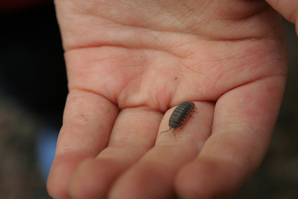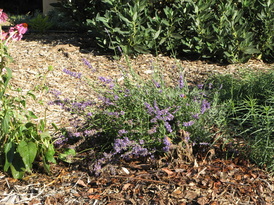
Throop Learning Garden has exploded with an infestation of roly-polies! You know the critters: small, dark grey, trilobite looking crustaceans with many legs: pillbugs or armadillidae, have a voracious appetite. They consume many times their body weight in detritus and greens. They are capable of making lace from the most robust cucumber or lettuce leaves. Usually they are most welcome detritus removers, munching on fallen leaves. They are kept in check by predators like birds, beetles, and skunks. But when they have a population surge – watch out!
When it comes to garden pests, I am torn between a live-and-let-live stance and saving my harvest. When the environment cannot be balanced, eradication often means killing the pests. Therein lies the paradox of all gardens.
Balance is fleeting, as nature is never static. Harmony lies in an endless round of eating and being eaten – killing at its most primal. The reality is that all creatures kill to live: earthworms eat bacteria, aphids eat leaves, ants farm aphids, spiders eat ants, and so on up the food chain to us.
When it comes to garden pests, I am torn between a live-and-let-live stance and saving my harvest. When the environment cannot be balanced, eradication often means killing the pests. Therein lies the paradox of all gardens.
Balance is fleeting, as nature is never static. Harmony lies in an endless round of eating and being eaten – killing at its most primal. The reality is that all creatures kill to live: earthworms eat bacteria, aphids eat leaves, ants farm aphids, spiders eat ants, and so on up the food chain to us.
Humans have strong admonitions to avoid killing; witness the Biblical commandment and the first precept of Buddhism. This works in a limited way amongst humans, but not so much for the rest of our extended family of plants, animals, and landscapes.
While I conceptually abhor killing, I am greatly pained to idly watch my cucumber, squash, and green crops be decimated without intervening. Was it too much water? not enough? loss of a predator? Any intervention on my part will change the balance of life forms in the garden. This is the microcosm reflecting the macrocosm.
We humans have changed the balance of our environments throughout history, simply by existing. We alter the landscape through agriculture, mining, and building. We have killed ecosystems indiscriminately through our carelessness, wastefulness, and lack of mindfulness. It is up to us to alter our collective mindset and behavior to one of sustainable stewardship.
So back to the microcosm of the garden: I admit to a halfway measure to salvage crops. I added sand and diatomaceous earth only around the tender greens. This impedes the roly-polies by lacerating their gills. Grisly, but effective. This specifically treats the plants that were being eaten, and does the least harm to beneficial insect allies, allowing balance to be restored. The plants will be spared to be shared by all the garden denizens, including humans.
— January Nordman
While I conceptually abhor killing, I am greatly pained to idly watch my cucumber, squash, and green crops be decimated without intervening. Was it too much water? not enough? loss of a predator? Any intervention on my part will change the balance of life forms in the garden. This is the microcosm reflecting the macrocosm.
We humans have changed the balance of our environments throughout history, simply by existing. We alter the landscape through agriculture, mining, and building. We have killed ecosystems indiscriminately through our carelessness, wastefulness, and lack of mindfulness. It is up to us to alter our collective mindset and behavior to one of sustainable stewardship.
So back to the microcosm of the garden: I admit to a halfway measure to salvage crops. I added sand and diatomaceous earth only around the tender greens. This impedes the roly-polies by lacerating their gills. Grisly, but effective. This specifically treats the plants that were being eaten, and does the least harm to beneficial insect allies, allowing balance to be restored. The plants will be spared to be shared by all the garden denizens, including humans.
— January Nordman





